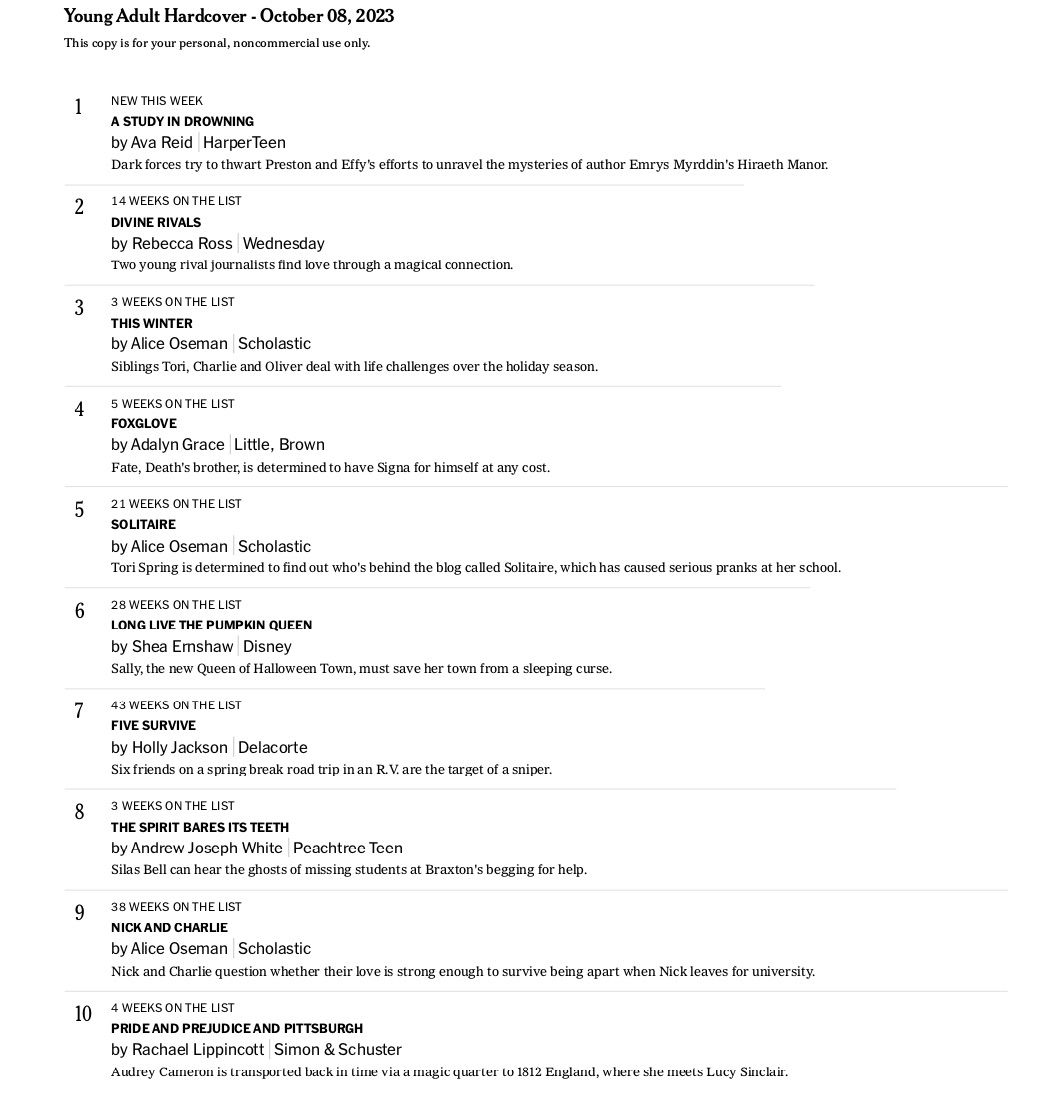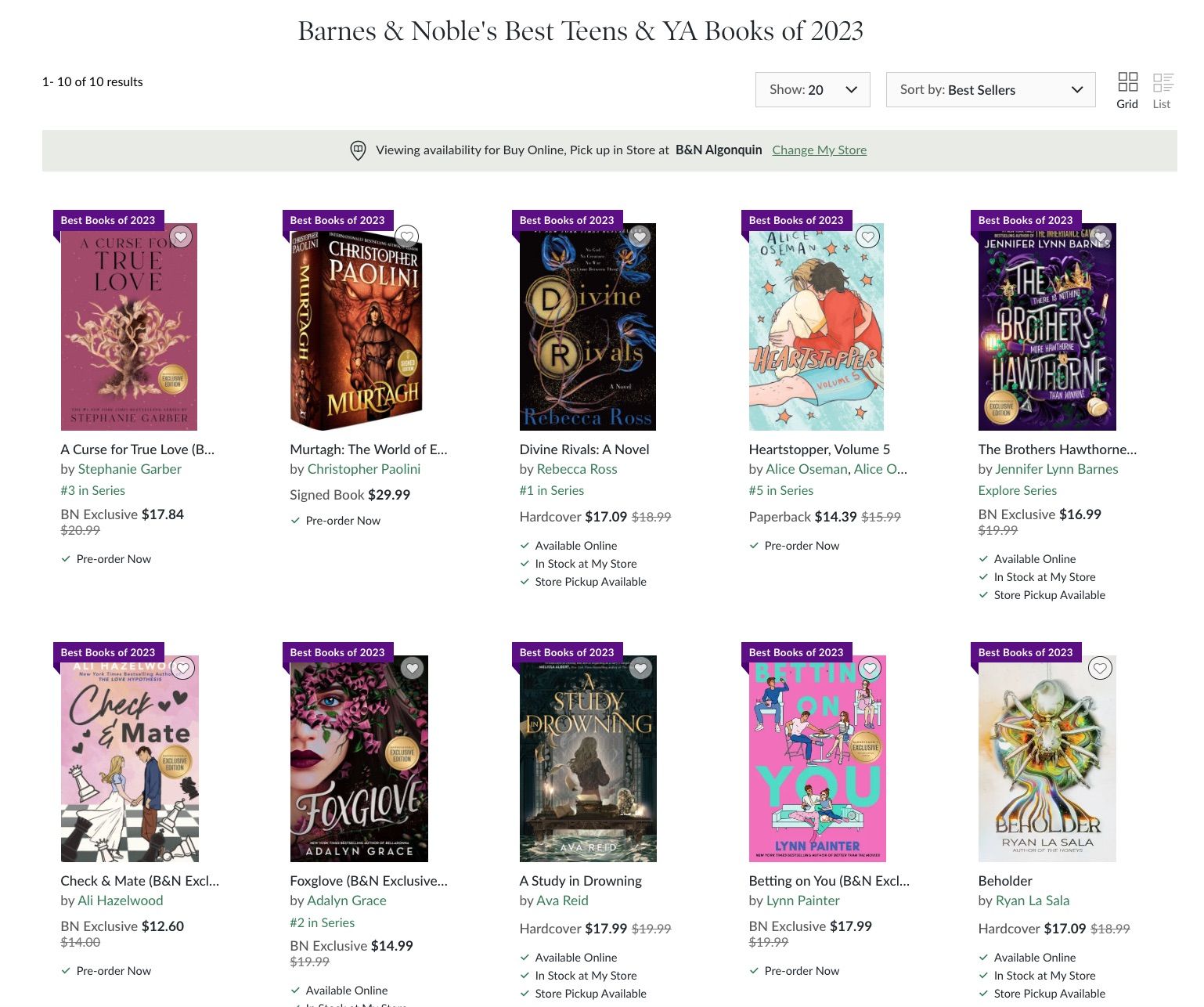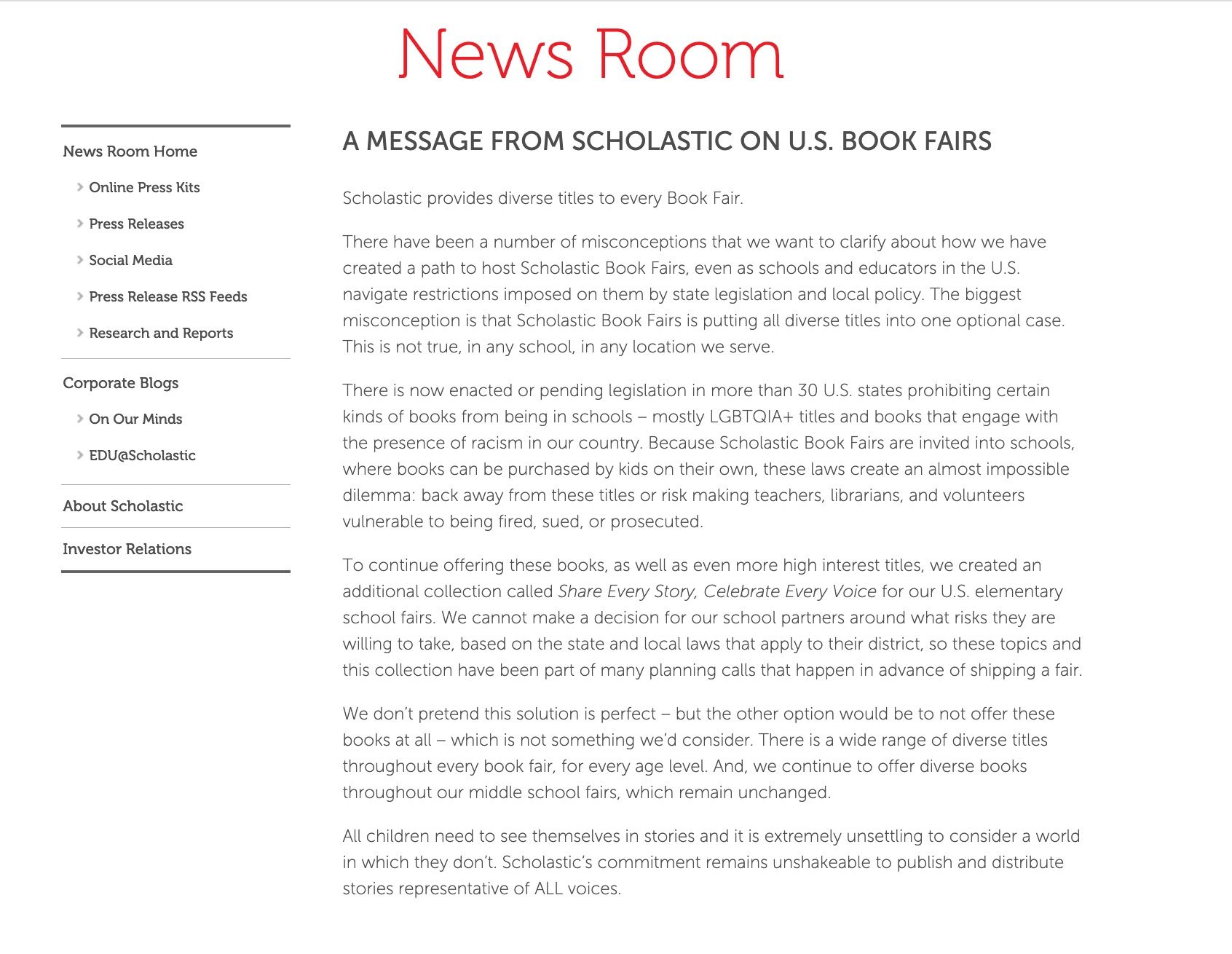In July 2024 — nine years ago — We Need Diverse Books was founded. The nonprofit dedicated to addressing the lack of diversity in publishing emerged in response to yet another major book event showcasing a slate of white authors as their stars…plus Grumpy Cat. The movement to call out the whiteness of the industry was not new, but that year, it hit a fever pitch.
Malinda Lo tracked queer YA books published starting in 2011, continuing in 2012, 2013, and pulling together a great chart documenting change in this category between 2003 and 2013. Lo also tracked diversity in the YA bestsellers, as seen in Publishers Weekly in 2012, as well as diversity within the Young Adult Library Services Association’s annual Best Fiction for Young Adults list. Her number crunching on The New York Times Best Seller List in YA for 2013 made clear how few authors of color and characters of color were being given the budgets to succeed, if they were being published in any representative manner by the industry at all.
Earlier in 2023, I took the time to revisit the trends within The New York Times YA Best Sellers List on its tenth anniversary, and the rise in diverse books was impossible not to see — and impossible not to attribute to the tireless work of authors, readers, and advocates of color:
- 1,347 diverse books were represented on the list
In isolation, what does this number even mean? 1,347 books out of 4,446 were diverse. This comes out to about 30% of the total titles were by authors of color. Not too bad, given that the U.S. population itself is roughly 40% people of color.
More interesting, though, is the TREND in diverse books.
- 2012: 2 diverse books
- 2013: 2 diverse books
- 2014: 1 diverse book
- 2015: 20 diverse books
- 2016: 52 diverse books
- 2017: 165 diverse books
- 2018: 182 diverse books
- 2019: 228 diverse books
- 2020: 258 diverse books
- 2021: 244 diverse books
- 2022: 193 diverse books
In 2017, we saw the publication of Angie Thomas’s phenomenal The Hate U Give, which remained on and off the bestseller list up until the last year. We saw diverse books hit their peak in representation on the list in 2020, and they have been slipping back down again in the last two years. In 2020, diverse books represented almost half of the total books on the list.
There was a noticeable dip in diverse books on the NYT list in 2021, then again in 2022. And then, just a few weeks ago, we saw the first all-white New York Times YA list in a long time:

This kind of all-white list does not happen by accident. Especially when the week of new releases that this list encompasses was not only one of the busiest in YA publishing this year but also one of the most diverse.
The snow-white New York Times YA Best Seller List in October was no fluke. Just days before that list landed, Barnes & Noble decided to release their best books of 2023. Publishing a “best of the year” in early October is out of touch enough, but further salt in the wound on this was that the YA best books — again, as shared by one of the largest booksellers in the country — was a sea of white authors:

I could be generous here and venture to guess that Barnes & Noble’s selectors thought they were hitting some diversity counts by including Ryan La Sala, who is regularly thought to be a person of color. That generosity might be even more insulting.
At the 2023 AISLE Conference — an annual gathering of Illinois School Librarian Educators — I had the opportunity to deliver both a keynote and a session. During the session, which explored some of the trends in book banning, a librarian raised her hand and asked if we could talk about the Scholastic Book Fair thing. Having been out of the office for over a week at that point, I was not sure what that was but quickly learned as school librarian after school librarian began to talk about how they were now being asked to check a box in order to receive Scholastic’s collection of diverse books for their book fairs. This was just a couple of weeks after I wrote about how far-right actors, including Brave Books, were jockeying to take down Scholastic Book Fairs as part of their war on information and access.
Scholastic turned their efforts not onto helping school librarians fight against the bigotry they’re experiencing by holding book fairs (not to mention having books, period) but instead, offered them a convenient way to be the ones withholding access to books. These weren’t just any books. They were the book fair’s diverse books.
After traditional working hours on Friday, October 13, Scholastic finally decided to address the rumors floating around social media about the state of their book fairs. These “rumors” began on Reddit, where school librarians were connecting with one another to talk about what was going on. Then they spilled into other forums, with dozens of writers and reporters wondering where and how to get their hands on answers.

The long and short of their mealy-mouthed statement? Because legislation in different states and municipalities is a reality, they need to put the onus on library workers to choose materials that are in compliance with those laws.
In short, we know diverse books are a problem, and we’re not going to help you except to put you, the beleaguered librarians, in the position of being the bad guys.
Where some publishers like Penguin Random House have entered into the fray to help overturn book bans — see the Escambia County lawsuit in Florida — Scholastic has instead decided to step away from the three-year rise in book censorship across the country. If anything, the above statement, in conjunction with recent social media posts like the one below, suggests that rather than help their marginalized authors or the librarians who make financial decisions that are crucial for the publisher’s survival, Scholastic will bank on adult nostalgia of the book fair.

Scholastic did not post their statement regarding their bigot button on Facebook as they did in the above image. The demographics of their Facebook followers are probably pretty different than those calling them out on Twitter, so why be transparent across platforms?
Not to mention that earlier this year, Scholastic asked author Maggie Tokuda-Hall to censor one of her own books in order to license it for book fairs.
Taken in isolation, all of these incidents are bad on their own. But together, the all-white book lists, all-white bestsellers, all-white “best books,” and option to remove diverse books from book fairs say one thing: the gatekeepers have given up the fight.
They’ve given up a fight they have yet to step into. A list of resources on your website is not action or activism. It’s repeating the statements found in dozens of other places. Not putting money behind diverse authors and diverse books shows itself in those best of and bestseller lists. This year has had dozens of amazing books by authors of color that should have hit either or both of these lists — especially during the busiest season for publishing in fall — and yet, it’s a sea of white.
Book sales across YA are down, and it’s not a surprise why: those who get to make decisions and create change are falling back on laziness, failing to step up and defend those who are most vulnerable — both the authors and the young readers who need and deserve access to those books — and people who have been watching the rise of book bans by right-wing bigots now for three years are giving up on giving industries money when the message is clear that the industries don’t want their money.
We won’t get out of book banning. Those who have power and influence are too eager to capitulate to groups like Moms for Liberty, No Left Turn in Education, and the scads of others across America who’ve made a cishet white christofascist agenda their priority at the expense of any and everyone else.
What even is there to say to that other than it’s disappointing, it’s angering, and it’s not at all surprising.
Only the bottom line matters.
(I urge you to spend some time with this piece on the ways in which school book fairs breed inequity this week as well — Scholastic’s language and decisions only reinforce this reality).
Book Censorship News: October 20, 2023
It is noteworthy that a large chunk of stories this week are shoved behind paywalls. Now that the mainstream media is cooling on coverage, there’s a nice trickle-down effect, and democracy goes behind a paywall again. These gatekeepers have also given the hell up.
- The Des Moines Register has put out open records requests to every district in the state of Iowa to find out what books have been removed from schools under the state’s new law. Here’s the database so far.
- The Miami Times Herald did something similar for the books banned in Florida this week, which you can access here.
- $100,000 was spent in the battle to keep the Samuels Public Library (VA) open this year. That was $100,000 of taxpayer money in a service area of 41,000 people spent on 53 bigots. Who is wasting taxpayer money again? (Psst: it’s not the library).
- Really sit with this story. The county commissioners of Louis County want the Timberland Regional Library (WA) to implement a book rating system for all the books in their multi-branch system. The county commission has no authority over the library district, and they do not have financial authority over it either. But how much tax money is being wasted to pretend to care about the children — if grown adults are calling It’s Perfectly Normal pornography, which is material written EXCLUSIVELY to arouse a person, that says a hell of a lot more about the prurient minds of these bigots than about anything else. Seems to me these far-right bigots are more in deep need of counseling for their repressed sexuality than the library needing a rating system, especially for books about puberty. If puberty makes you horny, then you’re also not in any position to determine appropriate material. I sense we know who the true perverts are.
- 70 books in Iowa City, Iowa, schools may be pulled permanently from shelves with their new law.
- There are noises from the right in Pennsylvania about a bill to ban books at schools. Recall there is also a bill to ban book bans here, too.
- This story is important, so it is paywalled, of course. Over 70 book challenges have been filed in Plano Independent School District (TX).
- Sold by Patricia McCormick will not be removed from an Alexandria, Minnesota, middle school, but students will need permission to borrow it.
- Pender County Schools (NC) are restricting student access to Thirteen Reasons Why and A Court of Mist and Fury after the book crisis actors performed passages at the board meeting.
- Almost 80 books are under review in Charlotte County Public Schools (FL).
- “The new school resource policy posted on the district’s website Friday morning would allow any student or their parents to challenge the use of literary and resource materials within the Blackhawk School District. Included in the policy are updates to the resource guidelines at the libraries and a new provision prohibiting content that is not ‘neutral.’” This is Blackhawk School Board (PA). Explain what a “neutral” book in the library would be, please.
- This story is paywalled, but it is about how the fight over book banning has moved from St. Tammany Parish Public Library to the Parish Schools (LA).
- Here’s a story about the rise of book challenges and bans in Colorado. It is also paywalled.
- Paywalls are back on the rise since mainstream outlets seem to believe they’ve done enough coverage of book banning. This one is about books being put onto a restricted list in Wilson County school libraries (PA). What the books are, I wish I could tell you.
- Another paywall, this time over book stuff in Tyler, Texas. If you’re thinking it’s not helpful to just know this is about “book stuff,” it might be worth taking it up with the paper because they don’t want you to know. (A Thursday story, not under a paywall, notes that People Kill People will NOT be removed from the Tyler Public Library).
- This is a story from my local paper, which puts everything behind a paywall, so YMMV on access. Huntley School Board (IL) was packed with right-wingers last election, so it should not be shocking to hear they do not want to comply with the new state anti-book banning law and want to forgo extra funding for the school libraries. They are so bigoted that having a policy against book bans is too much for them. The agenda is never hidden.
- Paywalled: the Pickens County, South Carolina, ban on Stamped might be overturned by a federal court.
- Huntington Beach, California, thinks they can just decide what books they don’t want in the public library. You’ll be shocked to hear the story is paywalled. You can get an accessible story here. And here’s an update, too — the city council is going to decide on books that are or aren’t appropriate. Recall one of the councilors behind this.
- Paywalled: more on the removal of a children’s book about gender identity from a Connecticut Public Library’s display on the topic of kindness. Kindness is also not paywalling information about the destruction of democracy, but what do I know.
- In more paywalled news, the Lafayette Parish Public Library (LA) has stopped a community reading program that they’ve offered for many years because it’s hard to find a book everyone would agree on. That…is the fucking point of a community read.
- Carroll School Board (MD) is considering some book bans. You can’t know about it, though, because the story is paywalled. Update: this article is ALSO paywalled, but it does list the books they’ve elected to ban. Too bad you can’t know, huh?
- Speaking of paywalled stories about censorship in Maryland, here’s one about Hartford schools. Sorry that I cannot tell you more.
- “The Nazareth Area School District [PA] may have to spend more than $100,000 in taxpayer funds to review 23 books if Northampton County Moms for Liberty members and those connected with the group move ahead with requests to get all of those books banned.” Who is wasting taxpayer money here?
- It sure is “interesting” that the appeal to the overturn of the Texas Reader Act — their wide-ranging book banning and rating bill that was enjoined by a federal judge — has been delayed. That gives the state three bonus weeks to deny people their First Amendment Rights.
- A Virginia State Senator is mad at her opponent for an ad depicting her as tied to state legislation that bans books. If you don’t want to be called a book banner, here’s a radical idea: don’t ban or write legislation that permits the ban of books.
- Jack of Hearts (and Other Parts) will remain on shelves at Mayfield High School library (NM).
- “The Chino Valley Unified school board [CA] will discuss a possible revision to the Library Media Centers policy that instructs schools to pull a book off shelves in libraries and classrooms if a parent submits a formal complaint alleging the book contains sexually explicit content.” This is a book ban, and under new California law, it’s not legal.
- Fairhope Public Library (AL) is being accused of having children’s pornography.
- Greenville County Library System (SC) has been quietly removing books from the shelves. This came to light in a 22-page report by a local anti-censorship group, which you can read right here. Note: I cannot verify the accuracy of the report here, and I’ve been told that the news story itself might not be entirely accurate by someone with more knowledge of the situation.
- Speaking of Greenville, they’re no longer allowed to have book displays.
- How adult author Jean Kowk became an anti-book ban advocate.
- The chair of Moms For Liberty in Wilson County, Tennessee, has challenged dozens more books that she, a grown adult, is getting aroused by.
- Book bans will be at the top of the 2024 Alabama legislative session.
- The Brandywine, Michigan, school board wants to define what books are too violent for the district to have in schools. Surely, that’ll go well.
- Let’s stay in Brandywine for a moment. It looks like some of the board had been in communication with right-wing media to stir up controversy about the books they don’t like. If you’re going to be this dumb about where and how you’re communicating with biased “news” as a board member, you don’t deserve to be on a board.
- Patmos Library, the beleaguered public library in Jamestown, Michigan, struck a compromise with the bigots. They’ll be…pasting the descriptions of the books from Amazon into the books. I guess the descriptions ON THE BOOKS don’t do the job. But at least the handful of queer books that scare the bigots won’t be pulled or labeled.
- Two former school librarians in Florida had enough of the legislating of their professional skills and knowledge and have opened up a bookstore instead.
- Central Ohio, your school boards are about to be taken over by the book banners if you don’t vote.
- Five books challenged in Guilford Schools (CT) will remain on shelves. They are the usual suspects.
- A member of the Alabama Public Library Service Board decided to attend one of the “Clean Up Alabama” meetings. A state employee with a job to help libraries attended a book banner meeting.
- Despite complaints bout 36 books, the Canby School District (OR) decided to ban “only” one book: Lolita.
- In Marietta County, Georgia, the ban on Flamer is being appealed.
- In Cobb County, Georgia, schools, a new policy is being considered for how books are added/removed from the collection. They’ve already banned a couple of books.
- Dayton, Oregon, schools may pull 5 books from their shelves after parental complaints. Update: the books will remain on shelves.
- Conroe Independent School District (TX) will vote on removing “sexually explicit” books next month.
- “About 106 books have been removed from the five district schools in response to SB 150. Personnel have removed 55 books from the high school, 17 from the middle school, 15 from Woodlawn Elementary School, 17 from Junction City Elementary and two from Perryville Elementary.” Here is something important to consider with these state-wide book ban laws. It was not until this moment, until this article, that it was known that OVER ONE HUNDRED BOOKS were removed from one school district in Kentucky. Imagine this in every district across that state (there are 171). The district in the story, Boyle, enrolls 2,671 students.
- A Colorado paper got its hands on the chat logs of some of the book banners in D20 (Colorado Springs). These are the people who want to run school boards and decide what kids can access.
- “From excerpts read during the public comment period, two of the titles appear to be All Boys Aren’t Blue, a memoir by journalist George M. Johnson about growing up Black and queer, and the free-verse novel Tilt by Ellen Hopkins. There was also a comment that likely referred to the 1996 novel Push by Sapphire.” So, absolutely nothing creative these adults performed at the Fluvanna County School Board (VA) meeting this week.
- 12% of Hampton County Library (IA) was slashed this coming year, and it might be over the eight books being challenged in the collection. This smells of the Samuels Public Library and Dayton Memorial Library stories — the bigots can’t get their way with the books, so they work their way enough to get funding to the entire public library cut. A few voices ruining an entire public institution get them even hotter than just getting the books off shelves.
- A nice piece on the impact of Texas’s READER Act and book bans more broadly on librarians in Lubbock, Texas. At least as much as one of these can be a “nice piece.”
- The son of the chair of Moms For Liberty’s Lancaster, Pennsylvania, chapter has complained about a book at Warwick High School. Set up? Or is this a solid definition of an adult who has groomed her son?
- Moms for Liberty has entered Queens, New York.
Also In This Story Stream
-
What Else Do Parents Who Believe Librarians Should Be Prosecuted for Library Materials Think?: Book Censorship News, October 13, 2023 -
74% of Parents Think Book Bans Infringe on Their Parental Rights: Book Censorship News, September 29, 2023 -
Student Groups Against Book Bans: Book Censorship News, September 22, 2023 -
Book Fairs Will See An Increase In Censorship Attempts This Year: Book Censorship News, September 15, 2023 -
Championing Inclusivity in Library Collection Policies: Book Censorship News, September 8, 2023 -
How To Alert Your School Board to Right-Wing Bad Actors: Book Censorship News, September 1, 2023 -
Library Bomb Threats Continue to Increase: Book Censorship News, August 25, 2023 -
Districts Are Turning to AI to Ban Books: Book Censorship News, August 18, 2023 -
Age-Restricted Library Cards Aren’t a Solution. They’re a Liability: Book Censorship News, July 28, 2023

